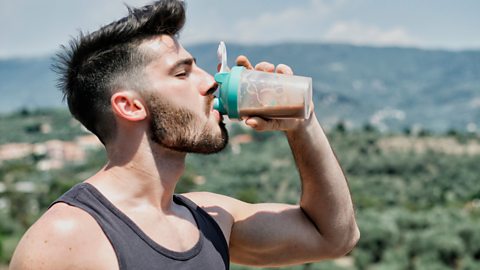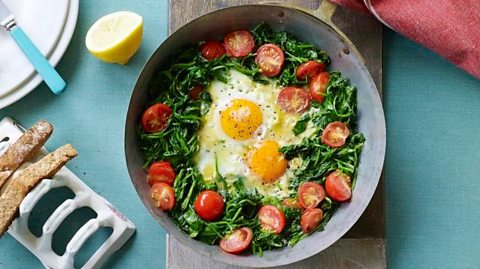Will eating more protein help you get fit at home?
With the UK in lockdown, many of us are looking for ways to get fit at home, and may consider increasing our protein intake to fuel exercise. Protein powder, a once niche product for bodybuilders, can now be found on supermarket shelves, in shakes, bars, fortified foods, capsules and even sweets. In 2016, a Mintel survey found nearly had used protein powder in the three months leading up to the study.
Â鶹ԌÅÄ Oneâs The Truth About⊠Getting Fit at Â鶹ԌÅÄ reveals expert advice on whether we need to boost our protein intake and what to consider before consuming protein shakes and supplements.

Do you need to supplement your protein intake?
The Department of Health 55.5g per day protein intake for men and 45g for women. But the average amount consumed by a 19-64-year-old man is 87.4g daily and woman 66.6g, according to the .
Protein requirements vary from person to person, depending on weight and physical exertion. âThose training to improve strength, fitness or similar need a little more proteinâ, says Graeme Close, Professor of Human Physiology at Liverpool John Moores University. He recommends a total of 1.5g protein per kg body weight for a person regularly training (90g protein for a 60kg person, for example).
Protein shakes are âa convenience, not a necessityâ for most people, says Professor Close, adding âthe best way to get your protein is from foodâ. However, there are instances when protein products might be beneficial.

Is it better to consume protein through food?
The most common type of protein shake is made from whey, a by-product of cheese. Itâs âmilk with the fats and sugar skimmed outâ, says Professor Close.
âOther forms of protein have become very popular, with various vegan proteins and blends including hemp, rice and pea proteinâ, says personal trainer Scott Laidler. But are they necessary?
Itâs important for those training to eat a âconsistent amount of protein throughout the dayâ, comments Professor Close. So if itâs not possible to eat when you need to, a protein product can help supplement the diet to meet a training target. But he recommends eating food naturally rich in protein throughout the day. âWake up in the morning and have an omelette, smoked salmon or yoghurt and berriesâ, he says. Meats such as beef and chicken, fish, eggs, dairy, lentils, beans, pulses, tofu and soy-based products are all good protein sources.
You can find protein-packed veggie recipes and a variety of higher-protein dishes on Â鶹ԌÅÄ Food.

Will protein powder help you build muscle?
âYou see all these pictures [of people] in menâs health magazines looking like Arnold Schwarzenegger in the mid-â80s, holding a protein shakeâ, says Professor Close. âThey donât look like that because of a shake, theyâve trained the house down and the rest of their diet is immaculate.â
While you need protein to synthesise new muscle growth, âresults will only be seen when following a well-considered exercise programme, eating a well-constructed diet, and getting adequate rest and recovery from your trainingâ, advises Laidler. Protein shakes arenât âa magic bullet or some kind of special âactive ingredientâ that leads to fast resultsâ. When protein is digested from any source, it is broken down into amino acids, the building blocks used for muscle growth. But you canât grow or strengthen muscles without exercise.
Will protein powder help you lose weight?
âProtein digestion requires a higher energy expenditure [than some other macronutrients], so can help to reduce appetiteâ, says Dr Aishah Iqbal, a medical doctor, personal trainer and weight-loss coach. âHowever, using protein shakes as meal replacements for weight loss is often very unsustainable [and you] will commonly see the weight bounce back once the practice is stopped.â
An additional problem is that protein shakes do not have the same nutritional value as food, which makes them unsuitable for meal replacements. âThey donât have all the vitamins and nutrients that a balanced meal would containâ, says Professor Close.
Are protein bars healthy?
There is a wide range of protein bars, and some are less healthy than others, containing additives, sugar and unhealthy fats, so itâs important to read the label. âYou could make your own trail mix, with naturally high-protein ingredients such as nuts and seeds, as an alternativeâ, says Laidler.

How to pick a protein product
If you are struggling to reach the required protein level for the amount of exercise you do, despite doing your best to consume protein from naturally protein-rich foods, British Dietetic Association clinical and sports dietitian Rick Miller it is acceptable to fill âin the gaps with a reputable brand of protein supplementâ.
âTop athletes use products batch-tested by quality insurance third parties, which often have a logo, such as the Informed-Sport badgeâ, says Professor Close. He adds this is sound advice for the non-pro supplement taker too.
A number of protein powders contain more calories, carbohydrates and protein than you need. Some products, often called âmass gainersâ, can be very high in calories and carbohydrates.
If you want to take a protein supplement, "always read the label carefully, take the recommended serving size, and donât be tempted to take far more than is necessary, as this is not supported by the current evidenceâ, concludes Miller.
Protein products are not for everyone
âThose with pre-existing kidney issues should be mindful of excessive protein intake, as there is an indication it can worsen the diseaseâ, says Dr Iqbal. If youâre unsure, ask your GP to refer you to a registered dietitian for advice.
The says âthereâs also evidence that, in the long term, consuming too much protein can lead to an increased risk of osteoporosisâ.
Protein supplements are not recommended for children due to the lack of research into long-term effects.
To find a suitable trained and qualified sports nutritionist, visit the Sport and Exercise Nutrition Register website.
You can watch The Truth About⊠Getting Fit at Â鶹ԌÅÄ on Â鶹ԌÅÄ iPlayer.
